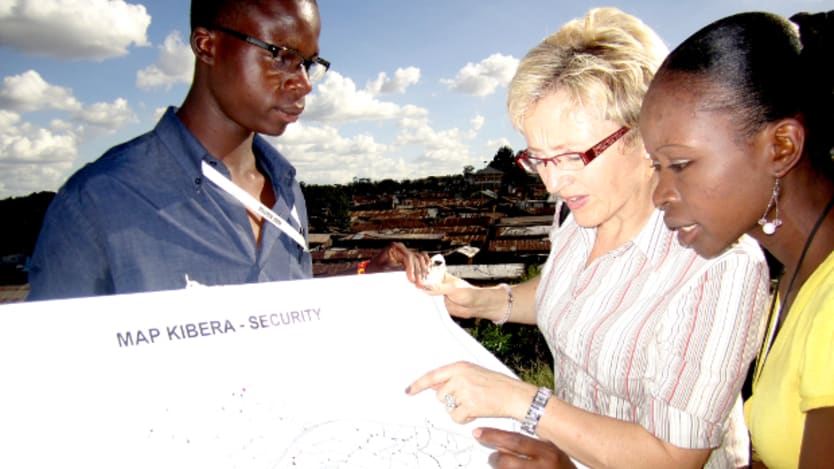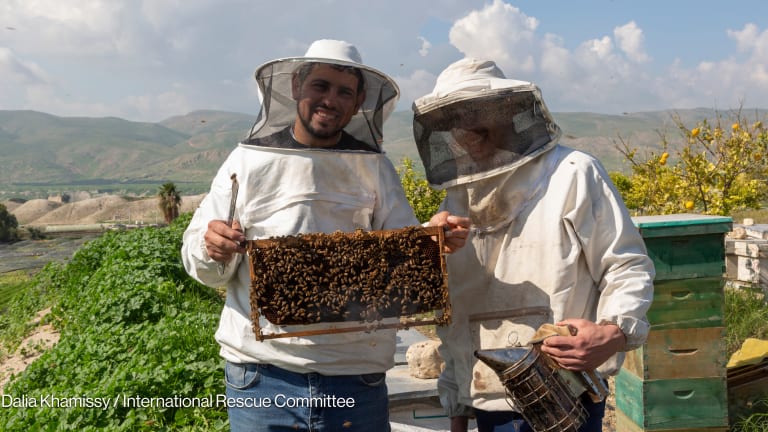
In our work at U.N.-Habitat, we have found that investing in youth resilience is critical to the positive development of youth and their communities. Resilience is defined as the ability for young people to cope, adapt to and effect change. If youth are resilient it allows them to overcome difficulties in their lives, something that is critical for youth living in the developing world who are often faced with poverty, limited employment and lack of access to services.
“People say you will be leaders of tomorrow, but you are already leaders of today. I do not want to leave the world in this shape for you; I wish for a better world, better for all, ” said U.N. Secretary-General Ban Ki-moon at the Children and Youth conference. A key focus of this conference is increasing the resiliency of youth and their communities.
U.N.-Habitat’s Urban Youth Fund, which funds youth-led groups in the developing world, supports youth and community resilience. We have funded 177 youth-led groups from 67 countries in the developing world, in issues ranging from climate change to the prevention of violence against women.
See more stories from #YouthWill Lead Tomorrow:
● What young people need to lead
● What can development actors do to involve youth
● The new rebels — from activism to policy entrepreneurship
● What young people want from development implementers
● Youth involvement needs to mean something
● Arts in advocacy: How to touch minds and hearts for action and change
One of the groups supported by the fund is Harassmap, a project run by young women based in Cairo, Egypt. Harassmap seeks to increase the resilience of young women and the communities they live in against harassment and violence. They use technology combined with grassroots organizing to map and improve the safety of women in Cairo. When someone experiences or witnesses sexual harassment, they can submit a report via SMS, email or social media that includes the details of the incident, as well as address. Harassmap then verifies the reports and places them on a Google map of Egypt. Following this, Harassmap visits the areas where incidences have occurred to raise awareness about sexual harassment and find ways to stop it. By meeting with local residents, Harassmap is mobilizing them to make their neighborhoods "harassment-free zones."
Another group that UN-Habitat supported is Sisi Ni Amani (“We are Peace” in Swahili) used a combination of traditional and innovative approaches to communication and dialogue to increase civic engagement and prevent violence in Kenyan communities. During Kenya’s elections, communication technologies were used to trigger and facilitate violence. Mobile phones in particular were used to spread hate speech and organize attacks.
Sisi Ni Amani used mobile technology as a tool for civic education, civic engagement and dialogue to help Kenyans realize their common needs irrespective of political divides. They provided a neutral source of credible information and peace promotion.
Key to increasing the resilience of youth is the recognition of them as leaders, who have a right to be engaged in the decisions that affect them. Youth are society’s most essential and dynamic human resource. There are more people under the age of 25 today than ever, totaling nearly 3 billion; 1.8 billion of those are between the age of 12 and 24. It is to the detriment of the youth, and society as a whole, to not fully engage them, the large majority of whom live in the developing world.
Youth 21 is an initiative sponsored by youth civil society and national governments that develops mechanisms to better engage young people in governance. In fall of 2011, UN-Habitat published Youth 21: Building an Architecture for Youth Engagement in the U.N. System, which outlined a number of ways the U.N. system could be made more youth friendly. One proposal was the creation of a special adviser on youth. In the spring of 2012, the U.N. secretary-general announced the creation of the envoy on youth, the highest level youth position ever created within the U.N. system.
Next on the agenda for Youth 21 is working towards creating a permanent mechanism within the UN system to advocate for and represent youth and their issues. The Asker Declaration, adopted at the Asker Conference on Youth and Governance, held in Oslo, Norway, in December 2014, mapped a way forward for the global community to develop this platform.
Youth have for too long been the lost demographic, with no or little attention given to their current and latent leadership potential. Building youth resilience and capacity is both a right and an imperative. As we move towards the adoption of the post-2015 development goals, let us partner with young people to bring about a sustainable future for the youth of today and tomorrow.
Want to learn more? Check out the Youth Will website and tweet #YouthWill.
Youth Will is an online conversation hosted by Devex in partnership with Chemonics, The Commonwealth Secretariat, The MasterCard Foundation and UN-Habitat to explore the power that youth around the globe hold to change their own futures and those of their peers.









